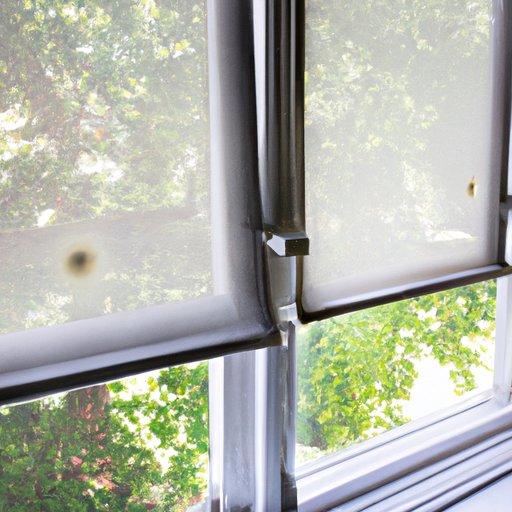
Introduction
Dirty window screens not only make your home look dingy, they can also affect the quality of air you breathe. Over time, dust, pollen, and other pollutants accumulate on window screens and can trigger allergies and respiratory problems. To avoid this, it is important to clean your window screens regularly. In this article, we will cover 7 topics that will help you keep your window screens spotless and healthy.
5 Simple Steps to a Spotless Window Screen
The first step to cleaning your window screens is to gather the necessary materials. You will need a bucket, mild soap or detergent, a soft-bristled brush, and a hose or spray bottle. Next, follow these 5 easy steps:
- Step 1: Remove the screens from the windows and lay them flat on the ground or a flat surface.
- Step 2: Use a soft-bristled brush to gently scrub both sides of the screen with warm, soapy water.
- Step 3: Rinse the screen with a hose or a spray bottle filled with clean water.
- Step 4: Use a towel or a squeegee to remove excess water from the screen.
- Step 5: Let the screen air dry before reinstalling it on the window.
If you have a large number of window screens to clean, you can save time by using a pressure washer.

5 Homemade Solutions to Tackle Dirty Window Screens
If you prefer natural cleaning solutions to store-bought ones, you can try these simple homemade solutions:
- Vinegar and water: Mix equal parts of white vinegar and water in a spray bottle and use it to clean the screen.
- Baking soda and water: Mix 1 tablespoon of baking soda with 2 cups of water in a spray bottle and apply it to the screen. Let it sit for 10 minutes before rinsing it off with clean water.
- Lemon juice: Mix 1 cup of lemon juice with 2 cups of water in a spray bottle and use it to scrub the screen.
- Dish soap and water: Mix a few drops of dish soap with warm water in a bucket and use it to scrub the screen.
- Essential oils: Add a few drops of essential oil to water in a spray bottle and apply it to the screen to mask any lingering odors.
Homemade solutions are not only eco-friendly, but they’re also much cheaper than store-bought alternatives.
Expert Tips to Ensure a Streak-Free Window Screen Cleaning
We interviewed a professional window cleaning expert to get insights and advice on how to achieve a smooth, clear finish on a window screen. According to our expert:
- Always start by removing loose dirt and debris from the screen using a brush or vacuum cleaner.
- Use warm, soapy water and a soft-bristled brush to scrub the entire screen, paying particular attention to corners and edges.
- Rinse the screen thoroughly with clean water to remove any soap residue.
- Use a squeegee or towel to remove excess water from the screen.
- Avoid using abrasive cleaning tools or harsh chemicals that can damage the screen.
Following these expert tips can help you achieve a streak-free result every time you clean your window screens.
Avoiding Common Mistakes When Cleaning Your Window Screens
Some common mistakes to avoid when cleaning window screens include:
- Using too much water which can damage the screen material and frame.
- Letting the screens dry in direct sunlight, which can cause them to warp or fade.
- Scrubbing too hard, which can leave scratches or tears on the screen.
- Not labeling screens or not remembering which screen goes to which window.
- Using a vacuum cleaner on a damaged screen which can make the damage worse.
If you encounter any problems during the cleaning process, such as holes, tears, or bent frames, consult a professional for repairs.
The Ultimate Window Screen Maintenance Guide
Cleaning your window screens regularly is just one aspect of maintaining them. Here are a few tips on how to care for your screens:
- Inspect your screens monthly for damage or wear and tear.
- Store the screens in a dry, cool place during the winter months.
- Repair any holes or tears in the screen material using a patching kit or hire a professional to fix them.
- Replace damaged or old screens with new ones to improve the appearance of your home and enhance the quality of air inside.
- Schedule a professional cleaning and maintenance check-up at least once a year to ensure your screens are in top condition.
By following these simple steps, you can extend the lifespan of your window screens and keep them looking great year-round.
Environmental Benefits of Cleaning Your Window Screens Regularly
Regularly cleaning your window screens can have a positive impact on the environment and your health. Here are a few ways:
- Removes allergens, dust, and debris that can trigger respiratory problems and allergies.
- Improves the quality of indoor air by increasing ventilation and reducing pollutants.
- Reduces the use of harmful chemicals and toxins that can harm the environment and your health.
- Using eco-friendly products like homemade cleaning solutions reduces the use of plastic bottles and commercial cleaners that can harm the environment.
Cleaning your window screens is a simple yet effective way to reduce your carbon footprint and improve indoor air quality.
Fun DIY Projects to Repurpose Your Used Window Screens
Don’t throw away your old window screens! There are many creative ways to repurpose them. Here are a few ideas:
- Use them as a photo frame or display board in your home or office.
- Transform them into a memo board or bulletin board to keep you organized.
- Create a unique piece of artwork by painting or printing on them.
- Use them as a room divider or privacy screen in your home.
- Repurpose them into a garden trellis or insect screen for your plants.
Upcycling old window screens is not only fun and creative, but it’s also an environmentally-friendly way to reduce waste.
Conclusion
Cleaning your window screens is an important part of maintaining a healthy and comfortable home. By following the tips and suggestions provided in this article, you can keep your screens spotless and eco-friendly. Remember to inspect and maintain your screens regularly, and don’t forget to repurpose your old screens into fun DIY projects. Your home will look and feel fresher, and you’ll be doing your part to protect your health and the environment.




